Victoria & Abdul
| Victoria & Abdul | |
|---|---|
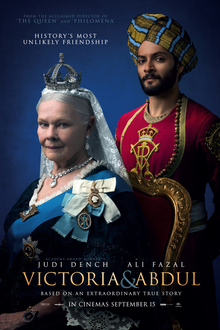 British release poster | |
| Directed by | Stephen Frears |
| Screenplay by | Lee Hall |
| Based on | Victoria & Abdul by Shrabani Basu |
| Produced by | |
| Starring | |
| Cinematography | Danny Cohen |
| Edited by | Melanie Oliver |
| Music by | Thomas Newman |
Production companies |
|
| Distributed by | Universal Pictures[1] |
Release dates |
|
Running time | 111 minutes[2] |
| Country |
|
| Languages | English, Urdu |
| Budget | $21 million[3] |
| Box office | $68.3 million[1] |
Victoria & Abdul is a 2017 British biographical historical drama film directed by Stephen Frears and written by Lee Hall. The film is based on the book Victoria & Abdul: The True Story of the Queen's Closest Confidant by Shrabani Basu, about the real-life relationship between Queen Victoria of the United Kingdom and her Indian Muslim servant Abdul Karim.[4] It stars Judi Dench, Ali Fazal, Michael Gambon, Eddie Izzard, Tim Pigott-Smith (in his final film role), and Adeel Akhtar. The film had its world premiere at the 74th Venice Film Festival and was theatrically released on 15 September 2017 in the United Kingdom. It has grossed over $65 million worldwide.[1]
The film was nominated for Best Costume Design and Best Makeup and Hairstyling at the 90th Academy Awards, and Best Actress in a Motion Picture – Musical or Comedy (for Dench) at the 75th Golden Globe Awards.
Plot[edit]
Abdul Karim, a young prison clerk from a Muslim, Urdu-speaking family in Agra, British India, is instructed to travel to Britain for Queen Victoria's Golden Jubilee in 1887 to present her with a mohur, a gold coin that has been minted as a token of appreciation from British-ruled India.
The Queen, lonely and tired of her fawning courtiers, develops an interest in and then a friendship with Abdul. She spends time with him alone and gives him a bejewelled locket with her photograph. She promotes him to be her Munshi and asks him to teach her Urdu and the Quran. She in fact learns Urdu for 13 years.[4] When Victoria discovers he is married, she has him bring his wife to England. His wife and his mother-in-law both wear black burqas, much to the consternation of the household—and the fascination of Victoria.
As Victoria's interest in India grows, she has the Durbar Room built at her Isle of Wight home of Osborne House for state functions. It is elaborately and intricately decorated, with a carpet from Agra, formal portraits of renowned Indians, a replica of the Peacock Throne and carvings by Bhai Ram Singh.
While Victoria treats Abdul as a son, his preferment is resented by her household and inner circle, including her son, Bertie, and the prime minister, Lord Salisbury. The household plots to undermine their relationship, hoping that Abdul will be sent home. When Victoria embarrasses herself by recounting Abdul's one-sided account of the Indian Rebellion of 1857 to the court, Victoria's faith and trust in him are shaken. She decides he must return to India, but soon changes her mind and asks him to stay.
The prime minister is adamant that the royal household must be rid of Abdul. They research his family background in India and present Victoria with a dossier showing that his family is more ordinary and poor than Abdul claimed. When Victoria insists that her doctor examine Abdul to learn why his wife has not become pregnant, he discovers that Abdul has gonorrhea. He expects the Queen will dismiss Abdul in disgust, but Victoria remains loyal to him and admonishes her courtiers for plotting against him. She announces her intention to give Abdul a knighthood.
Eventually, the household decides that Victoria must break with Abdul. If not, they all will resign and have Victoria declared insane. When Victoria is told, she angrily summons her family and the entire household and demands that anyone who wishes to give up their place should step forward. When no-one does, she says she has decided against making Abdul a knight. She will instead include him in her next honours list as a Commander of the Royal Victorian Order.
When Victoria falls ill, she urges Abdul to return to India while she can still protect him and warns him that the court will turn on him after her death. Abdul insists that he will stay until her death. In 1901, Victoria dies, and Bertie, now king, rejects Abdul, burning all the gifts and papers from the Queen, and sending him and his family back to India. Abdul's wife saves the locket Victoria gave him.
It is revealed that Abdul lived in India until his death eight years later in 1909. The film ends with Abdul kneeling at a large statue of Queen Victoria close to the Taj Mahal, talking to it and kissing its feet in respect.
Cast[edit]
The cast includes:[5]
- Judi Dench as Queen Victoria
- Ali Fazal as Abdul Karim
- Tim Pigott-Smith as Henry Ponsonby
- Eddie Izzard as Albert Edward, Prince of Wales ("Bertie")
- Adeel Akhtar as Mohammad Bakhsh
- Michael Gambon as Robert Gascoyne-Cecil, 3rd Marquess of Salisbury
- Paul Higgins as Sir James Reid, 1st Baronet
- Olivia Williams as Jane Spencer, Baroness Churchill
- Fenella Woolgar as Harriet Phipps
- Julian Wadham as Alick Yorke
- Robin Soans as Arthur Bigge, 1st Baron Stamfordham
- Simon Callow as Giacomo Puccini
- Simon Paisley Day as Mr Tyler
- Amani Zardoe as Princess Helena of the United Kingdom
- Sophie Trott as Sophia of Prussia
- Penny Ryder as Sophie of the Netherlands
- Joe Caffrey as Sous Chef
- Tim McMullan as Tailor
- Jonathan Harden as Wilhelm II, German Emperor
- John Rowe as Head Waiter
Production[edit]
On 17 June 2016, it was reported that Judi Dench would play Queen Victoria in Victoria & Abdul, a film based on the book of the same name by Shrabani Basu. Stephen Frears was set to direct.[6] Dench had also portrayed Victoria in the 1997 film Mrs Brown, to which this film has been described as an unofficial sequel.[6][7] On 5 August 2016, it was announced that Ali Fazal would play Victoria's confidant Abdul Karim, while the film would be co-produced by Working Title Films and BBC Films, and co-financed by BBC and Focus Features.[8] Focus also handles U.S. distribution rights, while Universal Pictures International handles all other countries. The script was written by Lee Hall, and the producers are Beeban Kidron, Tracey Seaward, Tim Bevan, and Eric Fellner, while the other cast includes Eddie Izzard, Michael Gambon, Tim Pigott-Smith, and Adeel Akhtar.[8]
Principal photography began on 15 September 2016, at Victoria's former royal residence Osborne House on the Isle of Wight.[9][10]
Costumes from the production were on display at Osborne House from 24 July until 30 September 2017.[11] To capitalize on the renewed interest in Victoria arising from both the film and the concurrent second series of ITV's Victoria television series, the Isle of Wight Tourist Board has created a 'Victoria's Island Trail' encouraging tourists to visit the key locations on the island that have connections to the Queen.[12]
The production also filmed at Chatham Historic Dockyard, Kent, on HMS Gannet and the quayside adjacent to the ship.[13]
Release[edit]
Victoria & Abdul was released for audiences in the United Kingdom on 15 September 2017.
Reception[edit]
Critical response[edit]
On review aggregator website Rotten Tomatoes, the film has an approval rating of 66% based on 199 reviews, with an average rating of 6.10/10. The site's critical consensus reads, "Victoria & Abdul reunites Dame Judi Dench with the role of Queen Victoria – which is all this period drama needs to overcome its imbalanced narrative."[14] On Metacritic, the film has a weighted average score of 58 out of 100, based on 34 critics, indicating "mixed or average reviews".[15]
In the Women's Voices for Change, Alexandra MacAaron, who rated the movie eight out of ten, wrote that "Judi Dench's Oscar-worthy second turn as Queen Victoria is a poignant portrait of fading power and human connection."[16] Christopher Orr's response from The Atlantic was positive, and he wrote "Victoria & Abdul is worth seeing for Dench's magisterial performance and for Frears's light but sure directorial touch. Just don't mistake it for actual history."[17]
Writing for NPR, Ella Taylor described the film as a "strange hybrid of a movie [which is] also a gentle love story with no possibility of an upbeat ending", though she praised the script as being "bold". In an article for The Independent, Amrou Al-Kadhi criticised the film's depiction of Abdul for its "offensive two-dimensionality".[18][19]
In the Daily Express, critic Andy Lea rated the film two out of five, describing Abdul's character as "disappointingly servile" and criticising the plot as "decent material for a knockabout farce", but praising Dench as "predictably brilliant".[20] In his 4-out-of-4-rated review, Rex Reed in the New York Observer wrote: "Judi Dench gives a touching, majestic performance" and, complimenting the script and direction, he said that "every scene is gorgeous to look at, every shot magnificently detailed and richly framed. And the exemplary performances are as good as it gets in movies today."[21]
======
Victoria & Abdul
Directed by Stephen Frears
A delightful dramedy about the Queen of England's friendship with a 24-year-old Indian clerk.
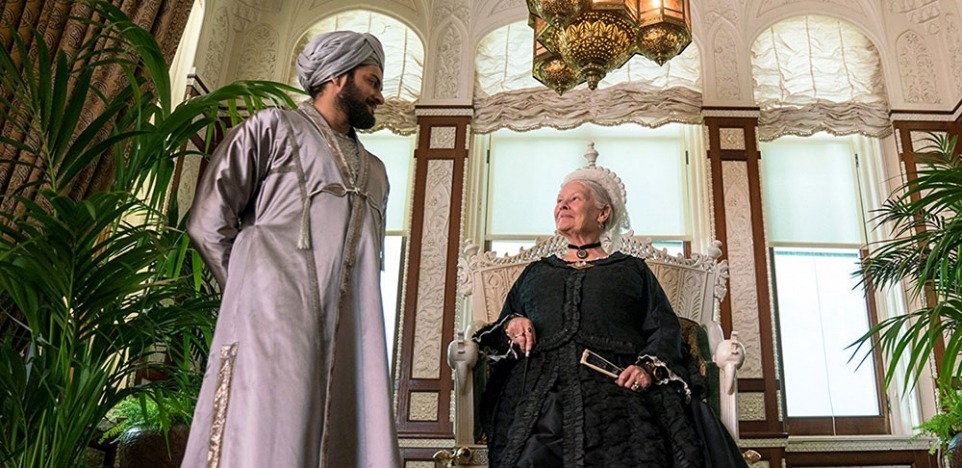
Film Review by Frederic and Mary Ann Brussat
TwitterFacebookLinkPrint
In her 80s, Victoria (Judi Dench) is Queen of England and Empress of lands covering nearly a quarter of the Earth's surface. Despite having nine children, she is a lonely woman, still mourning the loss of her husband Albert and her close companion John Brown, a Scots gillie. Now she overeats, falls asleep at banquets, and is bored with the members of the English establishment who are always trying to curry favor with her.
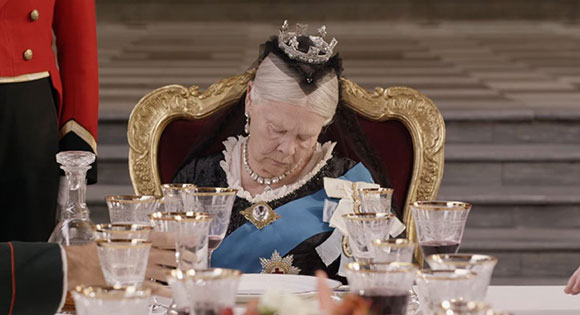
Abdul Karim (Ali Fazal) is a 24-year-old clerk in Agra, India. Because of his height, he is chosen to go to England and present a mohur (a gold coin) to the Empress. Also chosen for the trip is Mohammed (Adeel Ahktar), who often voices his anti-colonial feelings and calls the British barbarians. Arriving in England, the two outsiders are given new costumes and briefed on court protocol. For example, they must not look the Queen in the eyes.
At a sumptuous banquet during the Golden Jubilee celebrations, Abdul presents the coin. Then, surprising everyone, he bows down and kisses Victoria's foot. Further disobeying orders, he catches her eye. She later tells her staff she finds him very handsome.
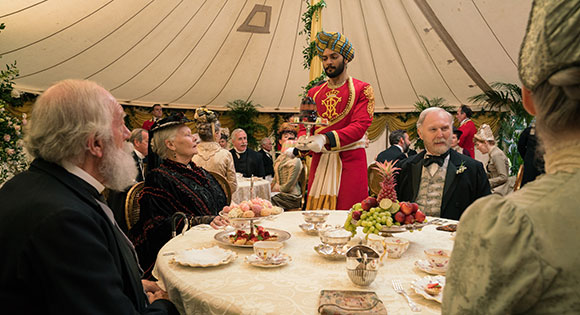
Before long, the Queen and this charming and knowledgeable Muslim forge a deep friendship. He shares with her the story of the Taj Mahal and the delights of Indian cuisine. He agrees to teach her Urdu, and she demands that he be called her Munshi (spiritual teacher). He leaves the servants' quarters for more luxurious quarters and is promoted to be her personal footman. She takes him to Balmoral, her estate in the Scottish highlands, and he even rides in his own carriage on the royal train.
This cross-cultural relationship has plenty of rough spots. Victoria is furious when she learns that he has a wife in India, but she arranges for his family to come to England. A more serious breach occurs when she discovers he has not told her the truth about Muslim involvement in the Mutiny, embarrassing her before the court. But treating him more like a son than a servant, she continues to admire and trust him.
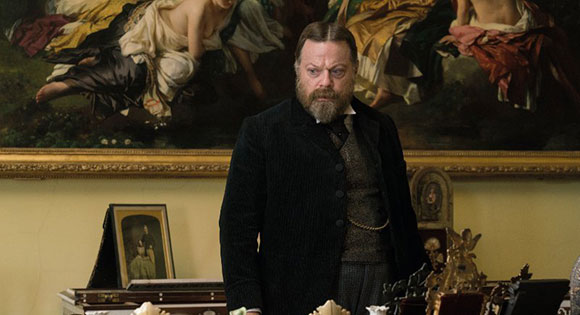
The same cannot be said of the Queen's aristocratic entourage and staff which includes Michael Gambon as the Prime Minister, Olivia Williams as Baroness Churchill, and Eddie Izzard as Victoria's son Bertie, the Prince of Wales. They justly earn the ire of the Queen as they ridicule and do everything possible to get rid of this outsider whom they think has too much power over her. After her death Bertie burns his mother's Urdu journals and all her correspondence with Abdul, revealing his disdain for the man who had overshadowed him for so many years as Victoria's teacher, friend, and confidant.
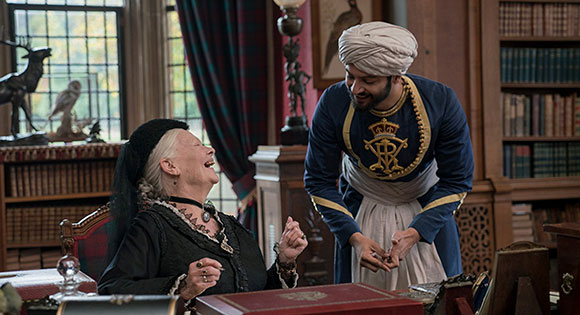
Director Stephen Frears keeps this story humming with his great gift for drawing out the many meanings of English ritual and racism. One of the magical moments occurs as the Queen is dying and Abdul recites a poem by Rumi, assuring her that she has been a drop in the ocean, but she will now be an ocean in a drop. It's a beautiful image for a woman who despite great worldwide power yearned for something more through her relationships.
빅토리아 여왕:
“나는 어렸을 때 죽음을 동경하곤 했어. 살 이유가 없는 이제, 나는 숨을 쉴 때마다 삶에 매달린다. 무섭다”
===
인도청년 아브둘:
겁먹지 마세요.
[루미의 시 인용]
“잘 들어라, 작은 물방울아, 후회하지 말고 몸을 맡겨라.
그 대가로 너는 바다를 얻게 될 것이다.
잘 들어라, 작은 물방울이여, 이 영예를 네 자신에게 주어라.
바다의 품에서 안전하리라."
===
----
[Quotes Rumi's poem]
“Listen, little drop, give yourself up without regret,
and in return you will gain the Ocean.
Listen, little drop, bestow upon yourself this honor,
and in the arms of the Sea be secure."
Rumi
=====
영화 '빅토리아 & 압둘 (Victoria and Abdul)을 보고
기자명 강신영 입력 2018.09.18
빅토리아 여왕과 인도 청년의 우정 실화
영화 제목으로는 별로 어울리지 않는 것 같은 제목이다. 근엄한 영국의 왕실이 배경으로 나오고 젊은 인도 청년이 출연한다니 웬 어울리지 않는 동화 같은 이야기인가 했다. 그런데 실화를 바탕으로 만든 영화라는 것이다.
빅토리아 여왕 역 주디 덴치
빅토리아 여왕 역 주디 덴치
음치 성악가의 카네기 홀 공연 실화 영화인 ‘플로렌스’를 만든 스티븐 프리어스 감독 작품이다. 1934년생 주디 덴치가 부드러운 카리스마의 빅토리아 여왕 역으로 출연했고, 인도 배우 알리 파잘이 24살 압둘 역으로 출연했다. 주디 덴치의 명연기가 압권이다.
이야기의 시작은 빅토리아 여왕의 재위 50주년을 기념한 인도의 모후르 금화 전달을 위해 인도의 스물네 살 평범한 청년 압둘 카림은 영국으로 가게 된다. 파티 연회장에서 빅토리아 여왕에게 식사 및 서빙을 담당하게 되어 있다. 해가지지 않는 나라라며 지구상 1/4을 지배하던 영국 전성기의 워낙 대단한 여왕이므로 그 앞에서 엄격한 행동 지침을 지시 받는다. 그런데 첫눈에 여왕과 카림은 눈이 맞는다. 여왕은 카림을 단순 서빙요원에서 상시 근접 요원으로 승격시킨다. 처음에는 워낙 신분 차익도 상대가 안 되고 나이 차이도 심해 눈 여겨 보지 않았으나 날이 갈수록 여왕의 카림에 대한 총애가 깊어지자 주변에서는 경계하기 시작한다. 카림은 여왕에게 인도에 관한 이야기를 전해주고 인도 글자도 가르친다. 인도 왕실에서는 궁전에 예술 작품을 전시한 방이 따로 있다며 영국 왕실에도 그런 시설을 갖추도록 조언한다. 모든 것이 카림의 영향으로 이루어지며 둘의 관계가 깊어진다. 여왕의 아들 및 주변 사람들은 카림을 더 이상 그냥 둘 수 없다며 뒷조사를 하고 교도소 감방 지기 출신이라며 추방을 요청하지만, 여왕은 꿈쩍하지 않는다.
여왕은 카림의 신분이 낮아서 무시한다며 기사 작위까지 준다는 명령을 한다. 아들과 주변 인물들은 극렬한 반대 의사를 보이며 여왕을 폐위시키고 정신병자로 몰 수도 있다며 겁박한다. 결국 여왕은 카림에게 기사 작위 대신 훈장을 주기로 하고 신상을 위해 인도로 돌아가라고 권한다. 그러나 카림은 끝까지 여왕을 보좌하겠다며 버틴다. 여왕은 연로하여 병석에 눕고 1901년 빅토리아 여왕은 64년간의 치세를 마치고 세상을 떠난다. 여왕이 죽자 눈에 가시 같은 존재였던 카림도 내쳐졌다. 여왕과의 관계가 있는 모든 문서들을 불태우고 카림은 인도로 추방되었다.
이 일은 여왕 사후에 한 조사관에 의해 추적되었다. 한 번도 인도에 가 본 일이 없는 여왕이 카레를 좋아했고 왕궁에 걸린 신원 미상의 인도 청년 초상화, 여러 가지 인도 보물들이 발견되면서 청년의 존재에 대해 추적하였고 이 청년이 쓴 일기가 카림의 고향에서 발견되면서 세상에 알려지게 된 것이다.
여기서 빅토리아 여왕에 대해 알아둘 일이 있다. 빅토리아 여왕은 왕 서열 5위로 왕이 될 꿈을 꿀 수도 없었다. 그러나 묘하게도 앞의 4명이 모두 일찍 죽거나 후사가 없이 죽는 바람에 18살에 여왕의 지위에 올라 무려 64년을 통치했다.
‘왕은 군림하되 통치하지 않는다’라는 방침으로 국사에 관여 하지 않았으나 국가에 중요한 마지막 결재는 쥐고 있었다고 한다. 그러므로 여왕의 주변에는 한 자리를 바라는 아첨꾼 귀족들로 둘러 싸여 있었고 대영제국의 위상이 최고조일 때이므로 왕실의 격식도 까다로웠다.
그때 나타난 카림의 존재가 싱그러웠을 것이다. 여왕은 재혼하여 아들을 두었으나 외지에 있는 동안 여배우와 동침했다는 소문을 듣고 남편이 질책하러 갔다가 장티푸스로 병사한다.
이 일로 아들을 미워하게 되고 아들에게는 50세가 될 때까지 정치에 손을 못 대게 했다. 어머니의 잔소리가 너무 심해 굉장한 스트레스를 겪었고 그로부터 탈출하기 위해 첫 결혼을 감행했다가 실패한다.
블로그 원문 보기:https://blog.naver.com/kang6922/221361441487
====
‘빅토리아&압둘’, 130년 전 우정이 지금의 우리에게
모바일한경 에디터2017-10-22 10:02:00
글자작게글자크게인쇄목록으로
[텐아시아=현지민 기자] 거대한 제작비 투입, 이름만으로도 기대감을 모으는 톱스타들의 출연만이 영화의 전부는 아니다. [별★영화]는 작지만 다양한 별의별 영화를 소개한다. 마음 속 별이 될 작품을 지금 여기에서 만날지도 모른다. [편집자주]
영화 ‘빅토리아&압둘’ 스틸컷
영화 ‘빅토리아&압둘’ 스틸컷
1887년 빅토리아 여왕의 재위 50주년을 기념해 인도 청년 압둘은 모후르 주화를 전달하기 위해 영국에 불려간다. 타고난 위트와 특유의 현명함으로 빅토리아 여왕의 마음을 사로잡았고 두 사람은 신분을 뛰어 넘어 특별한 우정을 나눈다. 영화 ‘빅토리아&압둘’의 시작이다.
‘빅토리아&압둘’은 빅토리아 여왕(주디 덴치)과 그의 시종이었다가 스승이 된 인도 청년 압둘(알리 파잘)의 우정을 담은 실화다. 빅토리아 여왕의 서거와 동시에 왕실은 두 사람의 친밀함을 엿볼 수 있는 기록을 모두 소멸했다. 하지만 2010년 압둘의 지인으로부터 그의 숨겨진 일기가 공개됐고, 123년 만에 역사상 가장 특별한 우정이 세상에 밝혀졌다.
81세의 나이. 많은 사람들의 통치자이자 두려움의 대상이기도 했던 빅토리아 여왕은 자신의 눈을 순수하게 바라보는 압둘의 모습에 매료됐다. 인도의 여황제지만 안전상의 이유로 인도를 방문할 수 없던 빅토리아 여왕은 압둘이 들려주는 이야기에 재미를 느끼고 그와 가까워진다. 나아가 압둘은 빅토리아 여왕에게 우르두어를 가르쳐주며 그의 문쉬(스승)가 된다.
영화 ‘빅토리아&압둘’ 스틸컷
영화 ‘빅토리아&압둘’ 스틸컷
극이 실화이긴 하지만 ‘신분을 뛰어 넘은 사랑 혹은 우정’은 다소 진부한 소재다. 그럼에도 극이 감동적인 건 우리가 몰랐던 빅토리아 여왕의 이면이 2017년을 살아가는 우리에게 전하는 메시지 때문이다.
빅토리아 여왕은 19세기 대영제국의 전성기를 이끈, 64년 간 재위한 인물이다. 남부러울 것 없어 보였던 그가 왕실 사람들의 질투를 받는 압둘을 감싸는 모습은 고집스럽기보다 애틋하다. 지켜야 할 사람은 많았지만 정작 자신을 지켜줄 이가 없던 그가 “너무 외롭다”며 눈물을 흘리는 모습은 먹먹하다.
화려한 고독. 삶은 풍요로워졌지만 깊어진 공허함을 토로하는 현대사회 사람들에게 화두를 던진다. 빅토리아 여왕의 확고한 믿음과 책임감, 여기에 신분과 나이·종교의 차이를 존중하는 관용 역시 이 시대에 필요한 미덕을 보여준다.
영화 ‘빅토리아&압둘’ 스틸컷
영화 ‘빅토리아&압둘’ 스틸컷
빅토리아 여왕의 성정을 섬세하게 표현하는 주디 덴치의 연기는 극의 감동을 배가한다. 주름이 가득한 얼굴에도 총명하게 빛나는 눈빛은 불과 18세에 지켜야 할 국민이 생긴 한 인물의 강인함과 자존심, 혜안, 유머, 내면의 외로움과 연약함을 보여준다. 얼굴을 가득 메운 주름을 타고 뜨겁게 흐르는 눈물 한 줄기는 여운을 남긴다.
흐름은 잔잔하지만 의외의 웃음 포인트와 볼거리가 배치돼 단조로움을 피한다. 잊을 만하면 소소한 에피소드를 던지며 관객들을 웃긴다. 간혹 압둘과 함께 영국에 간 친구 모하메드(아딜 악타르)의 돌직구나 압둘을 못마땅하게 여기는 왕실 사람들의 뒷담화 등이 그렇다.
인도를 시작으로 영국까지 펼쳐지는 공간 변화와 각 장소마다 특색이 묻어나는 건축물, 자연 경관 등은 그 자체로 압도적이다. 극 전반에 자리 잡은 화려한 영국 왕실과 인도풍의 디자인이 결합된 묘한 분위기의 배경 역시 신선한 볼거리를 제공한다.
오는 25일 개봉. 12세 관람가.
===
문화뉴스
[영알못의 600자리뷰] 영화 '빅토리아 & 압둘' 보고 당신이 분노해야 하는 이유
기자명 석재현 입력 2017.10.19 16:33 댓글 0
[문화뉴스 MHN 석재현 기자] 19세기 빅토리아 시대 영국은 '해가 지지 않는 나라'로 불릴 만큼 영국 역사에선 가장 빛났던 시기였고, 영국은 아일랜드와 인도를 비롯해 전 세계 지도의 25%를 차지했다. 뒤집어 말하면, 영국의 잔혹한 제국주의가 가장 적나라하게 드러났던 때가 바로 이 시기였다. 영국의 지배를 받았던 인도를 비롯한 수많은 국가는 영국에게 적대적일 수 밖에 없다.
이와중에 스티븐 프리어즈 감독은 그 시절 일어났던 빅토리아 여왕과 인도 청년 압둘 카림의 모든 걸 뛰어넘는 우정 실화를 그린 '빅토리아 & 압둘'을 내놓았고, 또 다른 시각을 제시하려고 했다. 결론부터 말하면, 빅토리아 여왕의 새로운 면을 보여주려다 되려 그의 이중적인 태도만 부각했다. 유색인종을 차별하지 않고 친구 삼더라도, 빅토리아 여왕은 '인도의 여황제'임을 항상 강조하며 자신이 우위에 있음을 드러냈다.
압둘 카림의 태도 또한 공감대를 형성하기 어렵다. 신분과 인종을 초월한다 하더라도, 빅토리아 여왕이 인도를 무력으로 제압한 국가의 수장이라는 사실은 변함없다. 마치 일왕과 뛰어넘는 우정을 그리는 친일파처럼 보였다. 이 괴상망측한 상황을 보고 '모하메드'처럼 분노와 어이없음이 느껴진다면, 당신은 지극히 정상이다.
===
모바일 한경
‘빅토리아&압둘’, 130년 전 우정이 지금의 우리에게
모바일한경 에디터2017-10-22
1887년 빅토리아 여왕의 재위 50주년을 기념해 인도 청년 압둘은 모후르 주화를 전달하기 위해 영국에 불려간다. 타고난 위트와 특유의 현명함으로 빅토리아 여왕의 마음을 사로잡았고 두 사람은 신분을 뛰어 넘어 특별한 우정을 나눈다. 영화 ‘빅토리아&압둘’의 시작이다.
‘빅토리아&압둘’은 빅토리아 여왕(주디 덴치)과 그의 시종이었다가 스승이 된 인도 청년 압둘(알리 파잘)의 우정을 담은 실화다. 빅토리아 여왕의 서거와 동시에 왕실은 두 사람의 친밀함을 엿볼 수 있는 기록을 모두 소멸했다. 하지만 2010년 압둘의 지인으로부터 그의 숨겨진 일기가 공개됐고, 123년 만에 역사상 가장 특별한 우정이 세상에 밝혀졌다.
81세의 나이. 많은 사람들의 통치자이자 두려움의 대상이기도 했던 빅토리아 여왕은 자신의 눈을 순수하게 바라보는 압둘의 모습에 매료됐다. 인도의 여황제지만 안전상의 이유로 인도를 방문할 수 없던 빅토리아 여왕은 압둘이 들려주는 이야기에 재미를 느끼고 그와 가까워진다. 나아가 압둘은 빅토리아 여왕에게 우르두어를 가르쳐주며 그의 문쉬(스승)가 된다.
영화 ‘빅토리아&압둘’ 스틸컷
영화 ‘빅토리아&압둘’ 스틸컷
극이 실화이긴 하지만 ‘신분을 뛰어 넘은 사랑 혹은 우정’은 다소 진부한 소재다. 그럼에도 극이 감동적인 건 우리가 몰랐던 빅토리아 여왕의 이면이 2017년을 살아가는 우리에게 전하는 메시지 때문이다.
빅토리아 여왕은 19세기 대영제국의 전성기를 이끈, 64년 간 재위한 인물이다. 남부러울 것 없어 보였던 그가 왕실 사람들의 질투를 받는 압둘을 감싸는 모습은 고집스럽기보다 애틋하다. 지켜야 할 사람은 많았지만 정작 자신을 지켜줄 이가 없던 그가 “너무 외롭다”며 눈물을 흘리는 모습은 먹먹하다.
화려한 고독. 삶은 풍요로워졌지만 깊어진 공허함을 토로하는 현대사회 사람들에게 화두를 던진다. 빅토리아 여왕의 확고한 믿음과 책임감, 여기에 신분과 나이·종교의 차이를 존중하는 관용 역시 이 시대에 필요한 미덕을 보여준다.
영화 ‘빅토리아&압둘’ 스틸컷
영화 ‘빅토리아&압둘’ 스틸컷
빅토리아 여왕의 성정을 섬세하게 표현하는 주디 덴치의 연기는 극의 감동을 배가한다. 주름이 가득한 얼굴에도 총명하게 빛나는 눈빛은 불과 18세에 지켜야 할 국민이 생긴 한 인물의 강인함과 자존심, 혜안, 유머, 내면의 외로움과 연약함을 보여준다. 얼굴을 가득 메운 주름을 타고 뜨겁게 흐르는 눈물 한 줄기는 여운을 남긴다.
흐름은 잔잔하지만 의외의 웃음 포인트와 볼거리가 배치돼 단조로움을 피한다. 잊을 만하면 소소한 에피소드를 던지며 관객들을 웃긴다. 간혹 압둘과 함께 영국에 간 친구 모하메드(아딜 악타르)의 돌직구나 압둘을 못마땅하게 여기는 왕실 사람들의 뒷담화 등이 그렇다.
인도를 시작으로 영국까지 펼쳐지는 공간 변화와 각 장소마다 특색이 묻어나는 건축물, 자연 경관 등은 그 자체로 압도적이다. 극 전반에 자리 잡은 화려한 영국 왕실과 인도풍의 디자인이 결합된 묘한 분위기의 배경 역시 신선한 볼거리를 제공한다.
No comments:
Post a Comment